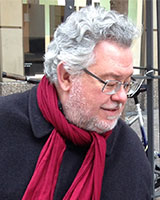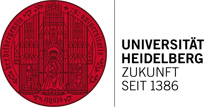“My wife and two kids fell in love with Heidelberg”

Prof. Dr. Izak Cornelius, Professor of Ancient Studies at Stellenbosch University in Stellenbosch/South Africa
1996 one-year stay as a Humboldt Research Fellow at Heidelberg University
When, how long and in what position did you stay at Heidelberg University?
The Cornelius family from Stellenbosch, South Africa was in Heidelberg for one year from December 1995 to December 1996. I was there as a Research Fellow of the Alexander von Humboldt-Stiftung during my Sabbatical.
Why did you decide in favour of Heidelberg University?
I decided on Heidelberg for two main reasons: On the one hand: The expertise of the renowned scholars Professors Jan Assmann (Egyptology) and Manfred Weippert (Old Testament and religions of the Ancient Near East). I worked on a book on the goddesses of the Levant who played a very important role in Egypt, and in this regard the expertise of these two scholars complemented each other very well. On the other hand: The specialised books in the libraries in Heidelberg (especially for Egyptology), which are not available at my home university.
What have you learned in Heidelberg? What experiences have been particularly valuable?
I attended seminars presented by both scholars and learned a lot on these occasions. I often had coffee with Prof. Weippert after one of his seminars where we compared Dutch (which he learnt because he had been a Professor in Utrecht in the Netherlands) and my own mother tongue Afrikaans (which developed at the Cape of Good Hope from 17th-century Dutch). One seminar also included a study tour to the Archaeological Museum in Istanbul. This was a unique opportunity and quite an experience to learn from experts such as Professors Maul and Weippert about the monuments in the museum during this tour. When I was in Heidelberg, Prof. Maul had just been appointed and I attended his lecturers on Ancient Near Eastern religions, which impressed me very much. I also had close contact with Dr Felix Blocher (now Professor of Near Eastern Archaeology in Halle), who was always willing to discuss matters of common concern. Other very kind people I also want to mention by name are Dr Friederike Kampp-Seyfried (then Prof. Assmann’s assistant and now the Director of the famous Ägyptisches Museum in Berlin), Prof. Erika Feucht (also from Egyptology) and Angelika Berlejung (now Professor in the chair for the “History and Religious History of Israel and its World” in Leipzig, and with whom I still have very strong contact; she is also a Professor Extraordinaire in my Department in Stellenbosch).
What did you like best about being in Heidelberg?
The libraries and discussions with fellow researchers on my academic work. Heidelberg is also a beautiful old city with the Neckar, der Schloß and many famous places. My wife and two kids fell in love with the city. In Heidelberg my wife made many friends and even learned to drive on the “wrong side of the road”. Since then my wife and I have visited Heidelberg on various occasions while I was on Sabbatical in other parts of Germany. Both our children attended the Schlierbacher Grundschule – they learned German and made many friends from all over the world. They also played with children from all over the world in the Gästehaus in Rombachweg and learned about other cultures (India, Russia, Costa Rica, etc.). The same is true of my wife who made South African treats for her Russian friends.
How did your career continue after your time in Heidelberg?
After my time in Heidelberg I returned to take up my existing permanent post as senior lecturer at Stellenbosch University. In 1999 I was promoted to full Professor in Ancient Studies and later served as the chair of the department.
What is your view of the German scientific system in comparison to that of your home country or to that of other countries where you may have conducted research?
Our system at undergraduate level might be quite different, because the students do not always come from very good schools. The University system is also closer to that of a country such as the UK. However, as far as advanced study and research are concerned, the differences are not that great. But what always impressed me about German scholars is their meticulous attention to detail and looking at the research material “ganz genau”.
In your opinion, what is the importance of international exchanges for researchers?
I live in a country which is relatively far away from Europe and international exchange is not always so easy because of the high costs of air travel. Because we come from a different part of the world, and more specifically the continent of Africa, we can also bring different perspectives. This also applies to German colleagues. I believe that living in the far south, we can look from the “outside” and from a distance at scholarship in countries in Europe, North America, the Middle East and other parts of the world. We are also not so much caught up in the so-called “Schule” approach of Germany. But international contacts and exchanges are of paramount importance for all of us, because we all bring into our research something of our unique backgrounds and cultures. Together we can perform this task better, because “diversity is the spice of life”.
Do you recommend a research visit to Heidelberg University to your students or to colleagues in your scientific network?
Most definitely. Some of my colleagues have already spent periods doing research in Heidelberg. But when we think about Heidelberg it is also with some sadness, because one of our colleagues and the wife of another passed away while on Sabbatical in our beloved city. But then again - what a place on earth to die!

